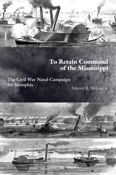To Retain Command of the Mississippi
The Civil War Naval Campaign for Memphis

- Author(s): McCaul Jr., Edward B.
- Series:
- Imprint: Univ Tennessee Press
- Publication Date: 2014-11-26
- Status: Active
- Available in Hardcover - Cloth: Price $55.00 | Buy Now
- Leaf eReader required for PDF ebooks
The Mississippi River was a strategic priority for the Union army from the outset of the American Civil War. By controlling the Mississippi, the North’s military forces could effectively split the Confederacy in two and create economic and logistical havoc for Confederate supply lines that relied on river transportation. A number of battles were fought for control of the Mississippi, and ultimately the combination of Union troops supported by Federal gunboats and armored paddle steamers culminated in the surrender of Port Hudson in July 1863 and Union dominance over the Mississippi waterways.
The Battle of Memphis was one such fray waged for control of the Mississippi. It was a major victory for the Union, one that was over almost before it began because of luck and lessons the Union fleet learned at a hard-fought battle with the Confederate River Defense Fleet at Plum Point. Perhaps owing to its swift conclusion, the Battle of Memphis has not received the scholarly attention of other battles, such as Vicksburg and Forts Henry and Donelson. In To Retain Command of the Mississippi, Edward B. McCaul Jr. argues that the Battle of Memphis was pivotal in the Union’s efforts to control the Mississippi River. The Union command, by narrowly escaping defeat at Plum Point, learned invaluable lessons about the Confederate River Defense Fleet and masterfully enacted those lessons in decisively defeating the Confederate fleet at Memphis. With the Confederacy’s river forces severely crippled after the Battle of Memphis, the Union fleets pushed onward to eventual victory at Vicksburg.
McCaul brings this pivotal river battle back into the American Civil War discussion by highlighting the Union gains and Confederate losses that led up to the Battle of Memphis and maintaining that had the battle gone differently, Grant’s plans for taking Vicksburg would have been drastically altered
Edward B. McCaul Jr. is Assistant Dean for Curriculum and Assessment in the College of Engineering at The Ohio State University. He is the author of The Mechanical Fuze and the Advance of Artillery in the Civil War, and his articles have appeared in Military History, Vietnam, and Aviation History.
